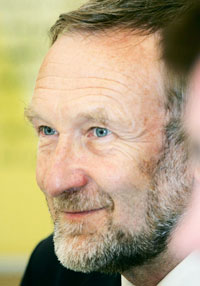Top consultant Francis Mordaunt calls it a day

In more than 40 years of farm consultancy and research, Francis Mordaunt has pretty much seen it all.
“Today’s agriculture is far removed from the one that existed when I started out with a slide rule and a mechanical adding machine in the 1960s,” he says. “But it’s the technological change that really stands out – the fact that wheat and milk yields have doubled and meat conversion rates have improved beyond recognition.”
Policy change has also been a major driver and Mr Mordaunt is one of the few in the industry to have a really thorough understanding of the common agricultural policy.
“Recent changes to the CAP – while not going as fast as I would have liked – have been in the right direction,” he says. “But I do believe the market should still play a bigger role, especially on lowland farms.”
Having said that, he still believes there should be a price safety net and that there is a need to maintain subsidies for hill farmers. “If we want people living and working in remote areas, we have to support them.”
With another reform on the horizon, how does Mr Mordaunt see the CAP developing post-2012? “I believe that the single farm payment system will get simpler, with more uniform rates across Europe. But the level of payment will fall, probably quite dramatically.
“And as funds are shifted towards rural development policy, this area will get more complex, especially if climate change policies are added to the already diverse mix of measures. Regulation is not going to go away from farming, that’s for sure.”
To cope with this, farmers are going to have to become more professional. “That does not mean they are going to have to get bigger. But they will have to adopt a more business-like approach and improve their management.”
As market forces become more apparent, farmers will also have to co-operate more and forge stronger links along the supply chain.
Mr Mordaunt says that one of his greatest disappointments has been the failure of British farmers to work together. “I’ve always been a great believer in farmers combining their strength, but they’ve never fully embraced it.”
He says he is encouraged by more recent initiatives to work with the food chain, citing dedicated milk groups and the tie-up with Hovis to supply 100% British wheat.
“The farm-to-fork concept should apply to all farm enterprises. It’s in everyone’s self-interest to ensure there is enough profit shared out, so everyone can reinvest. And once people start talking, the solutions come remarkably quickly.”
But Mr Mordaunt says he does not anticipate much change in farming’s fortunes coming from a change of government. “Over the years it has not made much difference which party has been in power. The UK’s policies have always been similar, with governments pushing for a reduction in farm subsidies, a more limited budget and greater exposure to market forces. That won’t change.”
MORDAUNT IN A MINUTE
• Grew up in Surrey, helping tend chickens on local farm
• Educated at Wells Cathedral School, Durham University and Reading University (agricultural economics) in 1960s
• First job with Lugg and Gould (later Laurence Gould)
• Moved to East of Scotland College of Agriculture, near Edinburgh, as a farm business adviser in 1980
• Consultant with Andersons from 1988, setting up research department in Melton Mowbray in 1996
• Retirement plans – move to Edinburgh and walk in the Highlands
For more on this story, see Phil Clarke’s Business Blog

